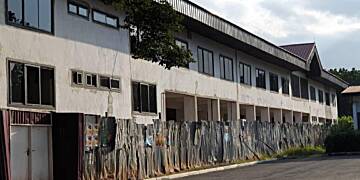Ghanaian media personality, George Quaye, has highlighted the dire state of the abandoned Performing Arts facility at the University of Ghana.
George Quaye, a graduate of the School of Performing Arts himself, emphasized the urgent need to address the neglected facility to harness the potential of the creative arts for economic growth and job creation in Ghana.
During his heartfelt speech at the Presidential Summit on Tourism themed, “Rethinking Tourism for Economic growth and Job Creation,” the Ghanaian actor drew attention to the dilapidated state of the drama studio.
He indicated that the facility can only accommodate a fraction of the school’s student population. With over a thousand students enrolled in the School of Performing Arts, the existing studio is insufficient to meet their needs.
“The drama studio there named after the late Efua Sunderland is big enough to host about 25 to 30 students. The school has way more than a thousand students. There’s a new one that was started about 20 years ago and has been abandoned,” he said.
Mr. Quaye highlighted the fact that other departments, such as Marketing, Science, and Law, had been provided with modern facilities, while the performing arts department has been abandoned for the past two decades.
“Around the same time other institutions started, for the Marketing department, Science, Law Faculty and all these others have been finished but one at the School of Performing Arts has been abandoned. I want to plead that we give it some attention and look at it. Because when it rains, students have to stop and when you’re there you’ve paid to watch a show and it starts drizzling the show has to be canceled. In 2023 Ghana, we cannot do that,” he added.
George Quaye further stressed the adverse impact of the neglected institution on Ghana’s tourism industry. He revealed that in the past, the School of Performing Arts had been a significant foreign exchange earner for the country.
However, he alluded that due to the challenges faced by the institution, foreign universities have resorted to hiring Ghanaian graduates to teach performing arts in their institutions, causing a decline in international students seeking education in Ghana.
“Now because of the challenges they have what the foreign universities are doing are rather putting students who have graduated from the institutions to go lecture there. Their students are no longer coming anymore. So if we’re looking at how the creative arts can contribute to the growth of the space I believe this is one of the things that needs urgent thoughts,” he stated.
He has urged the government to allocate resources and attention to the revival of the school, emphasizing that Ghana cannot afford to hinder the growth of its creative arts sector.
This serves as a reminder of the immense potential and significance of the creative arts sector as Ghana seeks to redefine its tourism industry to enable economic growth and job creation.




















